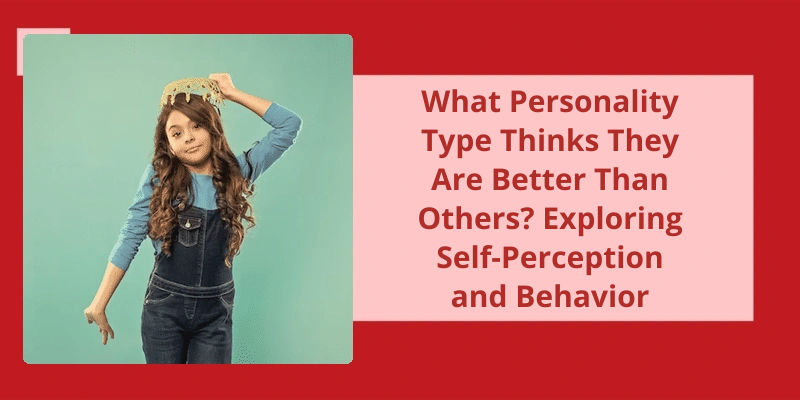Human psychology is a fascinating field of study, particularly when it comes to understanding why some individuals think they’re better than others. A superiority complex is a common behavior that can be observed in people who believe that they’ve superior abilities and achievements compared to everyone else. This form of self-inflation can manifest in a variety of ways and can be seen across all types of personalities. Whether consciously or unconsciously, individuals with a superiority complex tend to seek validation and admiration from others, often putting themselves on a pedestal and disregarding the achievements or opinions of anyone they deem inferior.
What Is the Strongest Personality Type?
ENFJs are known for their excellent communication skills and their ability to empathize with others. They’ve a natural talent for understanding people and their motivations, making them highly adept at inspiring and motivating others towards a common goal. This charismatic nature often allows them to take on leadership roles with ease, as they can clearly communicate their vision and inspire others to follow suit.
This allows them to navigate complex social dynamics and build strong, lasting connections with others. It also allows them to quickly pick up on conflicts or issues within a group, and address them before they escalate.
Another defining trait of the ENFJ personality is their sense of idealism and passion for making a positive difference in the world. They’re often drawn to careers in areas such as education, social work, or human rights, where they can use their interpersonal skills to make a real impact on the lives of others. This sense of purpose and drive can give them an unwavering strength and determination when it comes to pursuing their goals.
However, it’s important to note that strength of personality isnt necessarily tied to a particular personality type. Each individual has their own unique strengths and weaknesses, and no one type is inherently better or stronger than another. Additionally, factors such as upbringing, life experiences, and personal circumstances can all play a role in shaping a persons personality and strengths.
Ultimately, it’s more useful to focus on developing ones own personal strengths and cultivating positive relationships with others, regardless of where one falls on the Myers-Briggs personality spectrum. By embracing our unique talents and skills, and working collaboratively with others, we can all contribute to making the world a better place.
The Differences Between Introverted and Extroverted Personality Types and How They Can Impact Individuals and Relationships.
- Introverted individuals tend to recharge their energy by spending time alone, while extroverted individuals thrive on social interaction.
- Introverted individuals may be more introspective, analytical and observant, while extroverted individuals may be more outgoing, expressive and assertive.
- Introverted individuals may prefer deep one-on-one conversations, while extroverted individuals may prefer group discussions and networking.
- Introverted individuals may be more comfortable with routine and familiar settings, while extroverted individuals may seek out new experiences and enjoy taking risks.
- The ways in which introverted and extroverted individuals approach relationships can vary greatly and can lead to misunderstandings if not properly understood and accommodated for.
- It’s important for individuals to recognize and embrace their personality type, as well as understand and respect the differences of others, in order to build healthy and fulfilling relationships.
Understanding our personality types is an essential part of self-discovery. In this regard, the Myers-Briggs Type Indicator (MBTI) has become a popular tool to determine one’s personality type. Among the 16 personality types, the Thinker style is divided into four subtypes, namely: INTJ, ENTJ, INTP, and ENTP. Each Thinker type has it’s distinct characteristics and tendencies that we will explore in this article.
What Are the 4 Personality Types of Thinkers?
Personality types and traits have always been a fascinating subject to study, especially when it comes to understanding how individuals think and process information. The Myers-Briggs Type Indicator (MBTI) is a popular personality inventory that divides the Thinker style into four distinctive personality types – INTJ, ENTJ, INTP, and ENTP. Each of these personalities possesses specific traits and tendencies that indicate their cognitive preferences and decision-making styles.
Firstly, INTJ (Introverted-Intuitive-Thinking-Judging) individuals are known for their strategic thinking, problem-solving skills, and self-confidence. They tend to be independent, analytical, and organized, focusing on their goals in a systematic and rational manner. INTJs are often perceived as reserved, aloof, or distant, but this is merely a reflection of their introspective nature.
Secondly, ENTJ (Extraverted-Intuitive-Thinking-Judging) individuals share many traits with INTJs but are typically more assertive and outgoing in their approach. They thrive in environments that require leadership, strategic planning, and decision-making. ENTJs are natural-born leaders, and they enjoy challenging themselves with complex tasks and opportunities to demonstrate their skills.
Thirdly, INTP (Introverted-Intuitive-Thinking-Perceiving) individuals are scientific and analytical in their approach. They’re problem solvers at heart, and they enjoy delving deep into complex and abstract concepts. INTPs are known for their creativity, curiosity, and originality – traits that can sometimes lead to eccentricity or unconventional thinking.
Lastly, ENTP (Extraverted-Intuitive-Thinking-Perceiving) individuals share many traits with INTPs but are more outgoing and sociable. They possess excellent communication skills and enjoy debating, brainstorming, and exploring new ideas. ENTPs are natural innovators, always seeking out new and creative ways to solve problems and improve existing systems.
Although no one personality type is better than another, understanding our unique strengths and weaknesses can help us make better decisions, communicate more effectively, and navigate lifes challenges with greater self-awareness and confidence.
The Connection Between Personality Types and Creativity.
- Research shows that some personality types are more prone to creativity than others.
- Intuitive personality types tend to be more creative.
- Artistic and imaginative individuals often possess a high level of creativity.
- Individuals with a high level of openness to experience are often creative.
- People who score high on the trait of neuroticism can have a higher level of creativity.
- Emotionally stable individuals may be less prone to creativity.
- Personality traits such as extraversion and conscientiousness may not be strongly associated with creativity.
- Although personality type can influence creativity, it isn’t the only factor.
While some people tend to take things as they come, others may fixate on every little detail – this is where Type A personalities come in. Known for their perfectionist tendencies, individuals with this personality type often strive for excellence in every aspect of their life, whether it’s at work, school, or in their personal relationships. However, the desire to achieve perfection can sometimes lead to stress, frustration, and even burnout.
What Is a Type a or Perfectionist Personality?
These individuals are often described as competitive, assertive, and driven– they possess an innate desire to succeed and excel in all areas of life. They’re also highly organized and tend to be meticulous in their work, paying close attention to detail. In fact, they may even become upset or frustrated if things arent done exactly as they planned.
Type A individuals tend to thrive in high-stress situations, and may even enjoy the rush of a deadline or a high-pressure work environment. They’re often described as workaholics, and may struggle to balance their personal and professional lives. They’re highly goal-oriented and may become anxious or upset if they arent making progress towards their objectives.
It’s important to note that not everyone with a Type A personality is a perfectionist, and that there’s a wide range of personality types within this category. Additionally, some experts believe that the concept of personality types is overly simplistic and may not accurately reflect the complexities of individual personalities. Still, the Type A personality type remains a popular and widely recognized label, particularly in discussions of stress and work-related burnout.
While these traits may be beneficial in certain contexts, they can also have negative consequences if left unchecked. Anyone who identifies with this personality type may benefit from seeking balance, delegating tasks, and practicing self-care to avoid burnout and maintain well-being.
The Impact of Type a Personality on Interpersonal Relationships
- People with Type A personality are more focused on achieving their goals.
- They tend to be more competitive in nature.
- They’re often described as ambitious and driven.
- Type A individuals are generally good at multitasking and managing their time.
- They can sometimes be impatient and easily irritated.
- These traits can affect their interpersonal relationships, as they may come across as bossy or domineering.
- They may also struggle with empathy and understanding other people’s perspectives.
- However, with self-awareness and effort, Type A individuals can learn to communicate effectively and build healthy relationships.
Source: What’s a Type A Personality? The Type A Survival Guide
However, there are many different personality types out there, each with their own unique qualities that make them attractive to different people. In this article, we’ll take a closer look at some of the other personality types that are considered to be the most attractive and explore what it’s about them that people find so appealing.
Which Is the Most Attractive Personality Type?
Their confidence and charisma are simply irresistible to many people, and their laid-back attitude is a refreshing change of pace from the stress and pressure of daily life. ISTPs are often the life of the party, bringing a sense of fun and adventure to any social situation.
But while ISTPs certainly have their charms, other personality types are also highly attractive in their own unique ways. For example, ENFPs are well-known for their infectious enthusiasm and love of life. These types are often passionate and have a contagious energy that they easily share with others. Their creativity and imagination are also very attractive qualities, as is their ability to connect with people on a deep emotional level.
Similarly, INFPs are often considered to be highly attractive due to their gentle, caring nature. These types are usually very empathetic and sensitive, which allows them to form strong emotional connections with others. Their romantic and idealistic outlook on life is also very alluring, as is their desire to make the world a better place.
How Different Personality Types Attract Each Other in Relationships
- Introverts tend to attract extroverts who bring them out of their shell and push them to socialize more.
- Extroverts, on the other hand, may be drawn to introverts who’re good listeners and offer a calming presence.
- Sensitive people may seek out partners who’re also empathetic and emotionally attuned.
- Logical and analytical individuals may be attracted to those who share their passion for problem-solving and critical thinking.
- Creative individuals may be drawn to partners who share their love for the arts and self-expression.
- Spontaneous and adventurous people may seek out partners who’re willing to take risks and try new things.
- Organized and detail-oriented individuals may be attracted to partners who complement their strengths with their own strengths.
Conclusion
While most people have self-confidence, overtly thinking oneself as superior can lead to conflicts and negative consequences in personal and professional relationships. It's necessary to identify and fight against this complex, as it can hinder a person's ability to grow and develop on a personal level. In essence, true strength comes from acknowledging one's flaws and limitations, working hard for self-improvement, and recognizing that everyone has their unique set of strengths and weaknesses.






